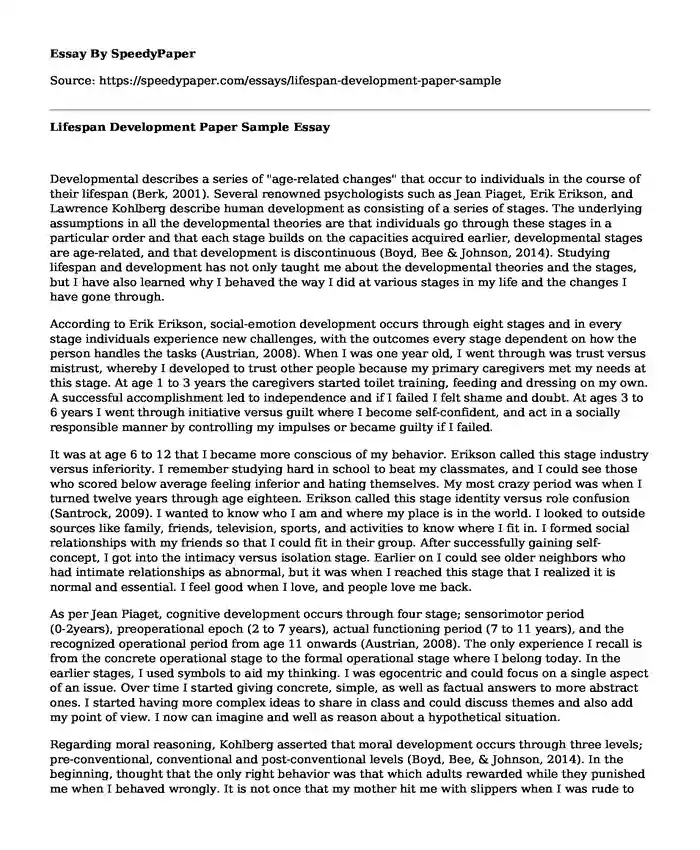
| Type of paper: | Essay |
| Categories: | Human development Lifespan development |
| Pages: | 3 |
| Wordcount: | 745 words |
Developmental describes a series of "age-related changes" that occur to individuals in the course of their lifespan (Berk, 2001). Several renowned psychologists such as Jean Piaget, Erik Erikson, and Lawrence Kohlberg describe human development as consisting of a series of stages. The underlying assumptions in all the developmental theories are that individuals go through these stages in a particular order and that each stage builds on the capacities acquired earlier, developmental stages are age-related, and that development is discontinuous (Boyd, Bee & Johnson, 2014). Studying lifespan and development has not only taught me about the developmental theories and the stages, but I have also learned why I behaved the way I did at various stages in my life and the changes I have gone through.
According to Erik Erikson, social-emotion development occurs through eight stages and in every stage individuals experience new challenges, with the outcomes every stage dependent on how the person handles the tasks (Austrian, 2008). When I was one year old, I went through was trust versus mistrust, whereby I developed to trust other people because my primary caregivers met my needs at this stage. At age 1 to 3 years the caregivers started toilet training, feeding and dressing on my own. A successful accomplishment led to independence and if I failed I felt shame and doubt. At ages 3 to 6 years I went through initiative versus guilt where I become self-confident, and act in a socially responsible manner by controlling my impulses or became guilty if I failed.
It was at age 6 to 12 that I became more conscious of my behavior. Erikson called this stage industry versus inferiority. I remember studying hard in school to beat my classmates, and I could see those who scored below average feeling inferior and hating themselves. My most crazy period was when I turned twelve years through age eighteen. Erikson called this stage identity versus role confusion (Santrock, 2009). I wanted to know who I am and where my place is in the world. I looked to outside sources like family, friends, television, sports, and activities to know where I fit in. I formed social relationships with my friends so that I could fit in their group. After successfully gaining self-concept, I got into the intimacy versus isolation stage. Earlier on I could see older neighbors who had intimate relationships as abnormal, but it was when I reached this stage that I realized it is normal and essential. I feel good when I love, and people love me back.
As per Jean Piaget, cognitive development occurs through four stage; sensorimotor period (0-2years), preoperational epoch (2 to 7 years), actual functioning period (7 to 11 years), and the recognized operational period from age 11 onwards (Austrian, 2008). The only experience I recall is from the concrete operational stage to the formal operational stage where I belong today. In the earlier stages, I used symbols to aid my thinking. I was egocentric and could focus on a single aspect of an issue. Over time I started giving concrete, simple, as well as factual answers to more abstract ones. I started having more complex ideas to share in class and could discuss themes and also add my point of view. I now can imagine and well as reason about a hypothetical situation.
Regarding moral reasoning, Kohlberg asserted that moral development occurs through three levels; pre-conventional, conventional and post-conventional levels (Boyd, Bee, & Johnson, 2014). In the beginning, thought that the only right behavior was that which adults rewarded while they punished me when I behaved wrongly. It is not once that my mother hit me with slippers when I was rude to her. With time I started to value rules (the conventional stage). I always wanted people around me to approve my behavior and was concerned with what the society expects of me. Later, I realized that what mattered to me was what I value. I could, and I always try to be a good person to live up to the societal expectations. I started thinking flexibly; I today (at the post-conventional stage) believe that the social values are important but absolute. Today, I can tell what is right or wrong without seeking approval of others because of the ethical principles I hold.
References
Austrian, S. G. (Ed.). (2008). Developmental theories through the life cycle. Columbia University Press.
Berk, L. (2001). Development through the lifespan. Pearson Education India.
Boyd, D. R., Bee, H. L., & Johnson, P. A. (2014). Lifespan development. Pearson.
Santrock, J. W. (2009). Life-span development (No. Sirsi) i9780073370217). Boston, MA: McGraw-Hill.
Cite this page
Lifespan Development Paper Sample. (2022, May 09). Retrieved from https://speedypaper.com/essays/lifespan-development-paper-sample
Request Removal
If you are the original author of this essay and no longer wish to have it published on the SpeedyPaper website, please click below to request its removal:
- Free Essay on the Communication Barriers Between Ghana and Chinese Cultures
- Student's Interview - Essay Example
- Essay Sample on the Fictional Story on Lwanda Magere
- Free Essay on Connection Between ADHD and Delinquency
- Why Do We Need Sleep? Free Essay for You
- Essay Example on Homelessness in Brevard County, Florida
- Institutional AffiliationSmartphone Impacts on Teenagers
Popular categories




